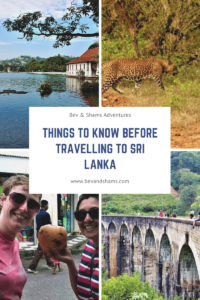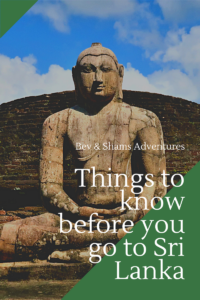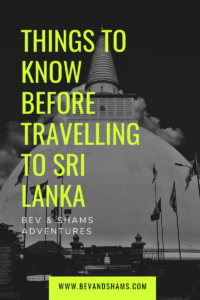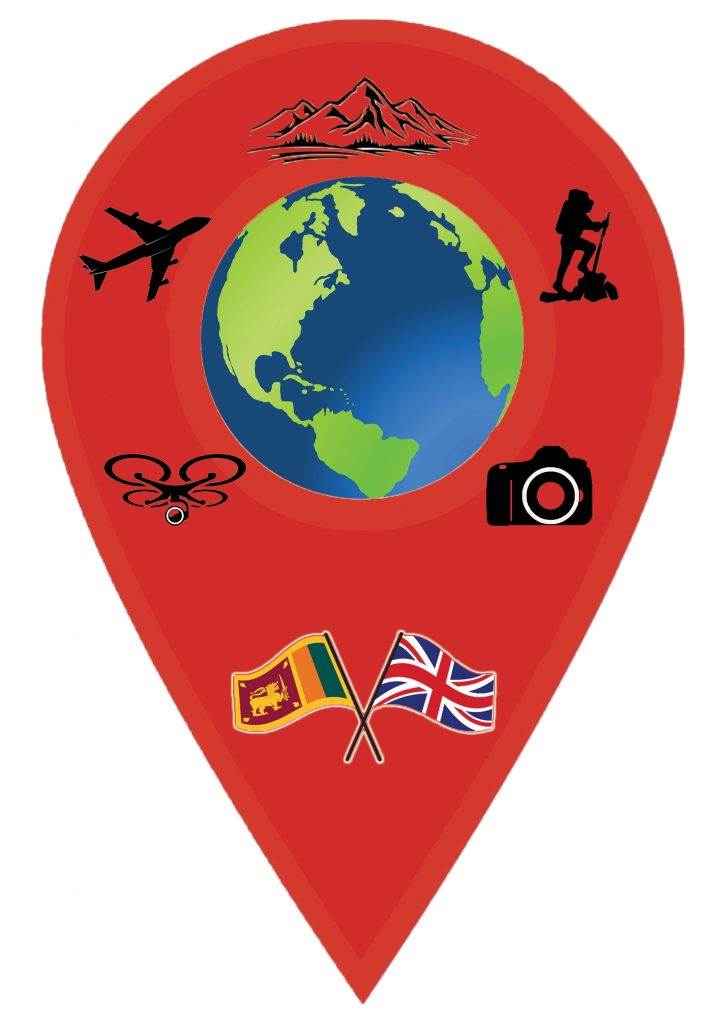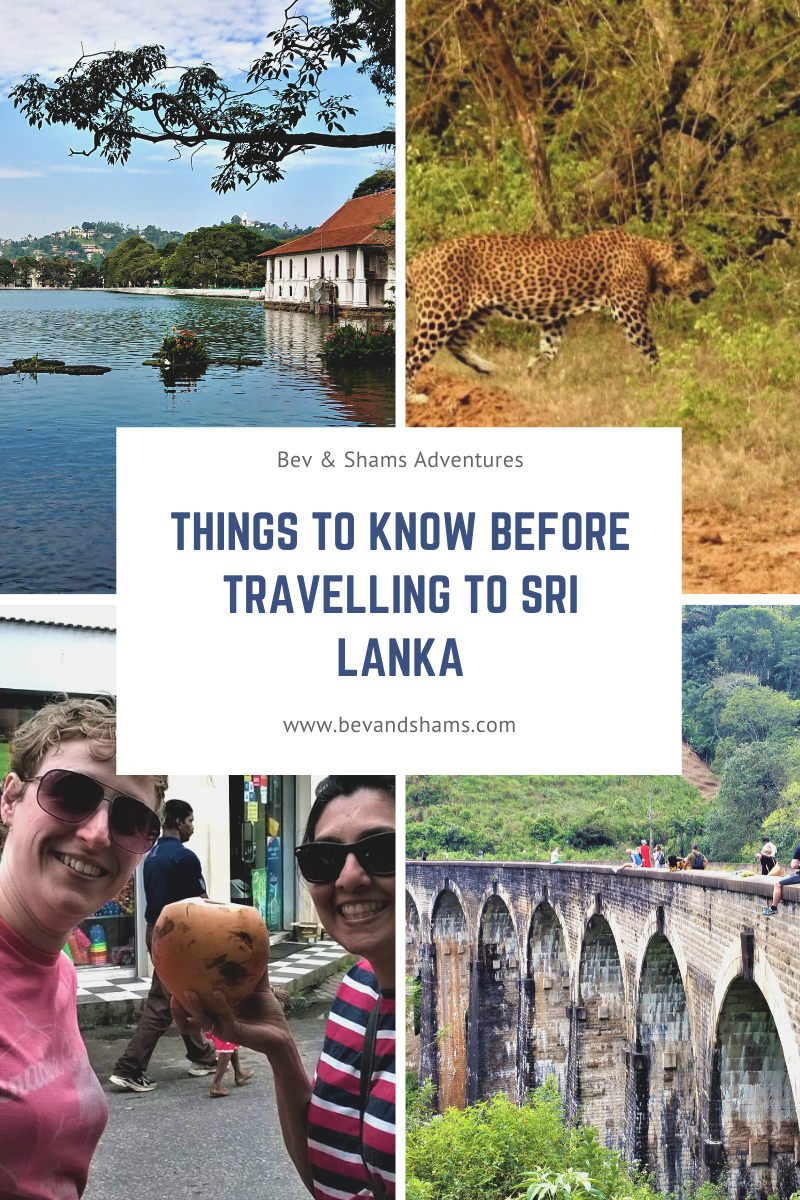Things to know before travelling to Sri Lanka
What’s not to love about Sri Lanka! The people are so friendly and hospitable. If you are looking for adventure or just somewhere to sit back and relax, then Sri Lanka is the ideal holiday destination for you. If you liked the sound of this, then there are just some things you will need to know before travelling to Sri Lanka.
Before any trip, you should always research the country, including how to stay safe, the currency, the language and so much more. With these Things to know before travelling to Sri Lanka, we help you have the best holiday, while staying safe and on a budget.
Table of Contents
Things to know before travelling to Sri Lanka
We cover everything you’ll need to know before travelling to Sri Lanka:
When to travel
You really could visit Sri Lanka at any time of the year, due to its tropical climate. However, Sri Lanka has two monsoons blow through the country a year. This won’t stop you from visiting! As the monsoon rain affects different regions at different times in the year. This means you can still catch that hot sun!
The best time to visit Sri Lanka is during their peak season of December to April. If you do not favour busy beaches and tourist spots, you may wish to avoid the peak season.

In our opinion the best time to travel is during Sri Lanka’s Sinhala and Tamil New Year Celebrations in April. There’s so much colour, vibrance, and hospitality during New Year, that we would be happy to return again to celebrate.
Monsoon seasons
If you can’t make your trip to Sri Lanka during peak season, or during the hottest month of April. Then you’ll need to plan where you go around the monsoon season.
May to July – the monsoon rain hits the south and west of the country between these months. Meaning travel to the north and east of Sri Lanka will be dry and hot.
October to January – monsoon rain hits the north and east. Making travel to the capital of the country and the beautiful beaches in the south ideal.
In our experience, during monsoon, you will be caught out in the rain. We would advise to avoid monsoon season unless of course you like the rain.
Health
You may require some jabs or vaccinations before travelling to Sri Lanka. We would recommend seeking medical advice from your GP, or local Travel Clinic 6 weeks before you travel, to establish if you do require any vaccinations.

The vaccinations you may require are:
Vaccines
- Measles, Mumps and Rubella
- Diphtheria and tetanus
- Hepatitis A
- Hepatitis B
- Japanese encephalitis
- Polio
- Rabies
- Typhoid
- Varicella
Health care is readily available, should you require medical treatment. If you do require medical treatment at a hospital, your local Embassy or Consulate will be able to provide you with a list of providers. Alternatively, most hotels will be able to call out a doctor should you require treatment or advice. Standard over the counter medical supplies such as painkillers, cold and flu remedies etc., can be purchased in pharmacies.
It would be a good idea if you were to purchase travel insurance prior to departure. Travel insurance not only covers you for any health care that you may require, should an accident occur. But it will also cover you for other eventualities. You can find out more about the advantages and disadvantages of purchasing travel insurance by checking our post on Travel Insurance.
Mosquitoes are rife in Sri Lanka and don’t we know about it. The number of times we have been bitten has been insane. But you must be careful. Whilst Malaria is low in Sri Lanka, the next biggest killer is dengue. If you get bitten, and start to feel unwell, you must seek medical attention. To prevent being bitten, you can follow some of these measures:
- Mosquito repellent is a must. The repellent we swear by is Jungle Formula role on. It’s quick and easy to apply, dries quickly, and no strong fragrant smell. It severely reduced the number of bites we get when we visit Sri Lanka.
- A good mosquito net set up over your bed, will prevent mosquito and other insects from entering the bed and biting you while you sleep.
Keeping hydrated is very important, especially with the hot weather, and what better than water to keep you hydrated. But do not drink the tap water! The tap water in Sri Lanka may have been treated to some degree, but there is a risk that you could get an upset stomach (Delli Belly). You should drink bottled water, or boiled water.

Sunburn
Even on a cloudy day you could get sunburnt in Sri Lanka. We would recommend using factor 30+ and reapply on a regular basis.
If you can stay out of the sun during the hottest time of the day (between 11am and 2pm), or stay in the shade.
If you do get sunburnt, you will find it could be very painful, so stay out of the sun or cover up until it gets better.
Visa
You will require a visa to visit Sri Lanka. Visa applications can be done online or on arrival. In our experience, you can apply for the visa as late as 1 week prior to your flight, and only takes a couple of minutes to complete. The cost of the visa is about US$35.00 per person. Once you have submitted the visa application, you’ll receive an email confirming if your visa has been granted or not.
You can find out more about applying for a visa to Sri Lanka by following our tips on how to apply for a visa to Sri Lanka.

Currency
The currency in Sri Lanka is the Sri Lankan Rupee (Rs).
You may wish to purchase the Rupee before travelling to Sri Lanka, and always make sure you have enough for the entire trip and some spare in the event of an emergency. It is possible to take your own currency with you, and exchange the money in Sri Lanka, as we often do this when we visit Sri Lanka. We must stress, that this is more convenient for us, and works out to be so much cheaper, however this option may not be suited for everyone, and not all exchange places will accept currencies other than US $, Great British £, or the AU $. Please research if this is a viable option for you, and if this is a benefit.

You may wish to use your debit or credit card on your travels in Sri Lanka. Always check with your bank or card provider, if they charge for foreign transactions. In our experience, using an ATM or debit or credit card may not be as expensive as you first thought.
Packing
Packing is essential when going on holiday, but you have to be smart about what to pack.
Depending on the region and time of year that you travel, will depend on the clothes you’ll need to pack. Sri Lanka is a tropical island, therefore the majority of the time, you’ll need to pack cool clothing, but if you are traveling to the hill country, then warmer clothing is a must.
It isn’t just the clothing you need to consider; you’ll need to pack the correct documents such as passport and visa if this is required.

Why not head over to our post on What to Pack for Sri Lanka. In this, we provide an extensive list of all the important things to pack. You can also download, a check list to help you pack the right things and never miss an item.
Language
The most common language spoken in Sri Lanka is Sinhala, but the official language is Sinhala and Tamil. The Sinhalese Sri Lankan’s speak Sinhala, whilst the Tamil Sri Lankan’s speak Tamil. English is the third language that’s spoken in Sri Lanka by most people.
If you don’t have an understanding of Sinhala, you can communicate with many in English, but there are some Sri Lankan’s that can’t speak English.
Budget
Before any trip to Sri Lanka, you will need to set a budget, this is so you do not overspend, you can keep control of your finances and don’t return home with a hefty bill to pay back.
In our experience, we found that Sri Lanka was quite inexpensive, especially when converting the currency from Rupee to Pounds and from Pound to Rupee.

To get a better idea on budgeting costs, we have included a table to help you to budget.
Staying safe in Sri Lanka
Overall, Sri Lanka is a safe place to visit. But it would be wise to continue vigilance at all times.
Always make sure that you keep in contact with a family member or a friend throughout your trip and provide them with your itinerary. If something happens to you whilst you are travelling and they don’t hear from you, then your family member or friend can raise the alarm with the authorities.
Make sure you research the safe and unsafe areas of Sri Lanka. You don’t want to be walking through a gang related area risking your life (unless you’re up for an adventure). If you are a solo female traveller, avoid traveling at night alone, as you could draw unwanted male attention, which could lead you into serious trouble.

Make sure you keep all your personal belongings safe, including your passport, money, important documents, etc., A bum bag is a valuable bit of equipment while travelling! You can keep your belongings in your bum bag, around your waist and beneath your clothing, which will prevent them from being stolen.
Be careful when it comes to tourist scams and tourist traps, do research on any scams or traps that could put you out of pocket or put you in danger.
Always take a tuk tuk or three-wheeler with a metre, if you don’t you could be over charged on a taxi ride or take you the longest route. Be careful with tuk tuk drivers, although they may be metred, they may still offer to take you to a jeweller, to try and persuade you to purchase jewellery. A couple of family members got taken to such a place and was locked in, which frightened them. They managed to exit the place without purchasing anything, but just be careful, they may not harm you, but it is still a scary situation to be in.
We would recommend downloading Uber or the Pick Me app, to book your next taxi. You can choose between tuk tuk or a vehicle, and you get to see who the driver is, you can also share these details with a family member or a friend. The price of the journey is set out prior to your departure, so you are fully aware of what you will be paying at the end of the trip. This is the safest way to travel by taxi.
Drink responsibly! Yes, that’s right, a holiday is a time to have fun and party on a night out. But you don’t want to get so drunk that you can’t make your way home and compromise your safety. Make sure you watch your drink being made and don’t leave your drink unattended, it is still possible to have your drink spiked.

If you are getting a taxi, make sure you book the taxi in advance and make sure a friend or family member has the date and time, including contact details for the taxi firm.
The list really could go on, when it comes to staying safe while travelling to Sri Lanka. By using a common-sense approach, will enable you to stay safe, but critically you’ll have so much fun.
Getting around
In our opinion the best way to get around Sri Lanka is by hiring a car, however driving is a little bit of a hazard, as other road users especially buses, do not adhere to the laws of the road. When we visit Sri Lanka, we often take public transport, or travel with family and friends as a large group and hire a van and driver. Whilst this is a viable option, it is a little costly when purchasing the van and driver with a smaller group.

Public transport is available but can be sparse in some areas. Here are just some of the types of transport available in Sri Lanka.
Driving
As mentioned, the best way to get around this small island is to hire a vehicle and drive. The road infrastructure in Sri Lanka is good, making travelling around Sri Lanka easily assessable. Rural areas will be challenging to navigate via limited public transport, so a vehicle may become a requirement in some areas.
The only negative with driving in Sri Lanka is the dangerous driving. Road safety isn’t adhered to, which can make it more challenging to drive. This is predominant in Colombo and other large towns.
In some places, you can hire a tuk tuk, have a short driving lesson before being let loose on the road. A tuk tuk is another great way to get around, it’s a bit bigger than a motorbike, but you can still be nippy and get you through traffic. There isn’t much space for luggage, but can carry passengers with ease. This could be cheaper to hire than a car.
If you’re travelling with children, then you’ll need some entertainment to keep them occupied? These car games for kids, will be ideal.
Airport
There’s only one international airport in Sri Lanka, which is about one-hour drive from Colombo. We have written a post on tips on how to navigate Colombo Airport, and look out for the interesting things on sale in duty free.

Public transport
Sri Lanka has a reasonably good transport network, there’s likely to be cases that some areas do not have public transport. In the main capital of Colombo and other major towns and cities, there’s plenty of buses, trains, and tuk tuks to get you around.
If you find that an area your looking to visit, it not assessable by public transport, then you may need to consider hiring a vehicle, or hiring a vehicle with a driver.
It is very hot in most areas of Sri Lanka, but not all public transport has air-conditioning. If you are looking for a bit more comfort, you’ll pay a little more, compared to non-air-conditioned transport.
Tips on taking public transport
- Bus stations are busy, and can be chaotic, so finding the right bus could be a challenge. Most of the buses in the major bus stations will now have destination signs in English.
- Purchasing tickets for the bus can be done in cash on board.
- There are three classes on a train. First, Second and third. First class has air-conditioning, and comfortable seating but is more expensive. Second class has comfortable seating with fans. Third class is the least expensive but packed with too many passengers, with standing room only, in cramped conditions.
- If you are looking for first or second-class tickets, you will need to book these in advance.
Top places to visit and why
There are so many wonderful places to visit in Sri Lanka, in our experience we would recommend, Sigirya, Galle Fort, and Polonnaruwa just to name a few.
Need inspiration on where to go in Sri Lanka, then check out our detailed content on Sri Lanka.

Food and drink
Firstly, we love Sri Lankan food, it has so much flavour, spice, and just all round delicious. In our opinion Sri Lankan food is far better than any other cuisine we have eaten, but there’s still good food in the world to be eaten.
Sri Lankan food mainly consists of rice and curry. The curry is built with different layers of flavour and spice, with many different condiments to accompany the rice and curry. Street food, and other cuisines are available, many being served in the big chain hotels.
Do you want to learn more about what food and drinks you could eat in Sri Lanka, then head over to our post on staple foods of Sri Lanka.

LGBTQ+
Unfortunately, LGBTQ+ is still illegal in Sri Lanka although it has not been enforced for at least 60 years. It is therefore a subject that is not spoken about, and prejudice is rife.
In our experience, it is becoming somewhat better, with small pockets of low-key LGBTQ+ places. Equal Grounds is a relatively new organisation set up to support the LGBT+ community and offers counselling, and useful resources.
Whilst we have not experience homophobic behaviour when we visit Sri Lanka, we do not advertise it, or discuss the matter for our own safety.
You will now have a good idea on how to stay safe, how to get around Sri Lanka, how you can budget for your trip and more with these essential things to know before travelling to Sri Lanka. We hope you enjoy Sri Lanka as much as we do and it won’t be long before you’ll want to be visiting again soon. We can’t wait to get back out there and visit somewhere different.
Continue your Sri Lankan travel planning, with these useful posts:
- Things to do in Galle
- How to apply for a tourist visa to Sri Lanka
- Best beaches in Sri Lanka
- Cheap places to eat in Colombo
- Best places to stay in Colombo
- Sinhala New Year celebrations
- Best places to visit in Sri Lanka
- Visiting Yala National Park
- Staple food of Sri Lanka
- Temple etiquette Do’s & Don’ts
There may be affiliate links within this article, using these links will not cost you anything extra, but we may earn a small commission to help us maintain our travel blog. Thank you for your support.
